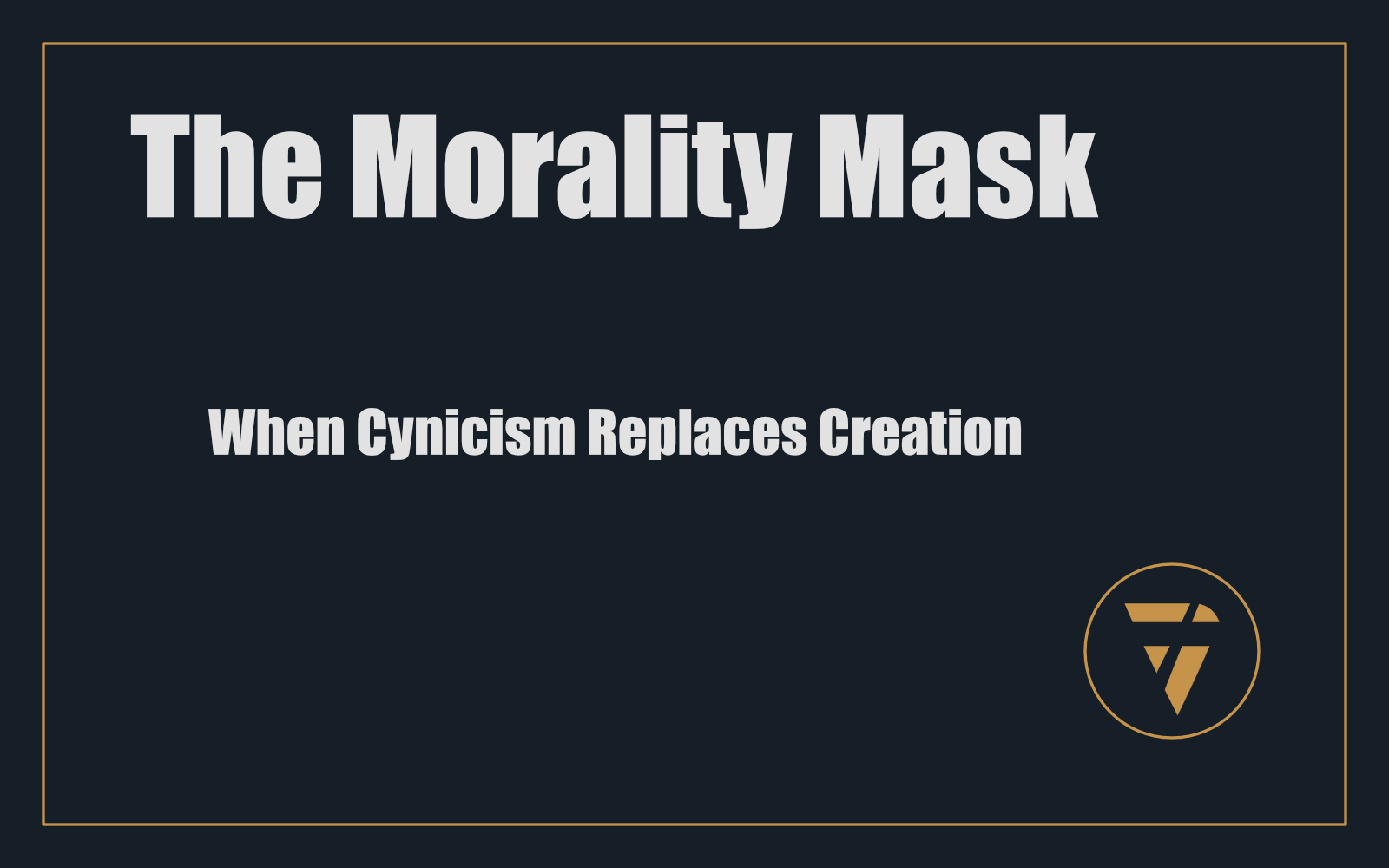The Morality Mask

When Cynicism Replaces Creation
Somewhere along the way, virtue became a brand.
It’s not worn. It’s deployed. Not to heal, but to win. Not to lead, but to corner. It no longer matters what you’ve built, what you’ve borne, or what you’ve solved. In today’s market theatre, it’s not your product that gets tested, it’s your posture. If you can’t perform outrage, you’re invisible. If you won’t condemn, you’re complicit. If you don’t moralise, you’re immoral.
This is not morality. It’s a marketplace distortion.
It’s cynicism, dressed as virtue. And it’s killing the builders.
Act I: The Shift
In a world once governed by merit, we’ve now entered the reign of perception. Language has been weaponised. Silence is framed as guilt. Nuance is confused with evasion. Speed of outrage has overtaken depth of understanding.
The founders feel it. Quietly.
The ones building payroll, not just profiles. The ones funding teams, not just retreats. The ones installing systems, not just slideshows. These are the people carrying the real cost—and watching as the court of social sentiment tries them in absentia.
You built something real? Prepare to defend it to people who’ve built nothing.
You paid your team through a downturn? Expect critique from consultants who’ve never signed a paycheque.
You scaled without burning out? Watch out. That’s probably “toxic productivity.”
It would be comical if it wasn’t systemic. But it is. The infrastructure of modern influence now rewards posturing more than production. Which is why you’re seeing a surge, not in results, but in moral theatre.
Act II: The Architecture of Cynicism
Here’s how it works.
- Step One: Create confusion. Cast doubt on the motives of anyone succeeding. Suggest that better is inherently suspect. That growth must come at a cost to others. That power is proof of corruption.
- Step Two: Assume the moral high ground. Speak with certainty. Speak in absolutes. Use the language of justice, inclusion, healing—words that carry weight, but demand no evidence.
- Step Three: Monetise the fear. Offer the fix. A course. A framework. A certification. A community. Something to protect people from the very threat you’ve just defined.
It’s elegant. It’s effective. And it’s entirely hollow.
Because behind the curtain, there is no product. There is no system. There is no consequence borne. Only signalling.
It’s not that the issues aren’t real—racism, inequality, capitalism’s distortions—these are serious. But when solutions become style over structure, we lose traction. When the people naming the problem have no skin in solving it, we lose truth.
And here’s the real tragedy: the builders retreat.
Not because they’re guilty. But because the game no longer rewards rigour.
Act III: The Cost of Playing Along
The temptation is strong.
Play nice. Perform the script. Use the language. Signal the stance. Get the likes. Avoid the backlash.
But here’s the thing about moral performance—it doesn’t scale.
Every word you say in that voice builds a structure you’ll eventually have to live inside. And when your business is anchored to sentiment instead of structure, you’ll collapse the second the market shifts.
More than that: you’ll begin to believe your own performance. You’ll confuse clarity for arrogance. Confidence for toxicity. Success for harm.
And that’s when you stop building. Not because you can’t. But because you’ve internalised the lie that motion is suspect.
I’ve watched founders downsize their vision just to avoid critique.
I’ve watched operators dilute their offer so it wouldn’t look “too strong.”
I’ve watched brilliant, generous, values-driven humans reduce themselves to shadows of what they could be—because someone told them that power was shameful.
This is the real damage of cynicism-as-morality: it doesn’t just slow progress. It severs self-trust.
Act IV: Vantage and Return
So what do we do?
We reclaim vantage.
Not as a view, but as a position. Vantage is clarity earned through consequence. It’s not opinion. It’s not theory. It’s insight you bleed for. It’s what you see after you’ve paid.
The founders must speak from this place.
Not to argue. Not to justify. But to install new infrastructure.
Because here’s the truth: no matter how loud the performance, the market still rewards solutions. The world still bends toward those who solve real problems. There will always be noise—but noise can’t compound. Only systems can.
So we return.
We return to:
- Clear offers
- Built infrastructure
- Motion with proof
- Growth with structure
- Revenue with integrity
We speak less. But what we say, we own. We sell without apology. We scale without permission. We install leverage instead of performing virtue.
This is not rebellion. It’s return. Return to substance. Return to consequence. Return to building the kind of businesses that don’t need propaganda—because their results speak louder than any script.
The Final Strike:
So when you feel the pull to posture—to soften, to perform, to moralise—ask this:
Am I building? Or am I just borrowing language to delay the cost of clarity?
If you are a builder, you don’t need the mask. You don’t need to prove you’re good. Your product will.
Cynicism is cheap. Creation is not.
And when morality is real, it doesn’t scream. It serves.
Let the noise rage. Let the theatre run.
You build.
That’s the only revolution that ever mattered.
This is what I’m working on. Tell me what you think, I enjoy the conversation! Subscribe and follow the work in real time.
Thanks!
B

They’re not righteous. They’re rehearsed.
Cynicism is their script, not their soul.
Builders don’t moralise. They install consequence.
PS -






